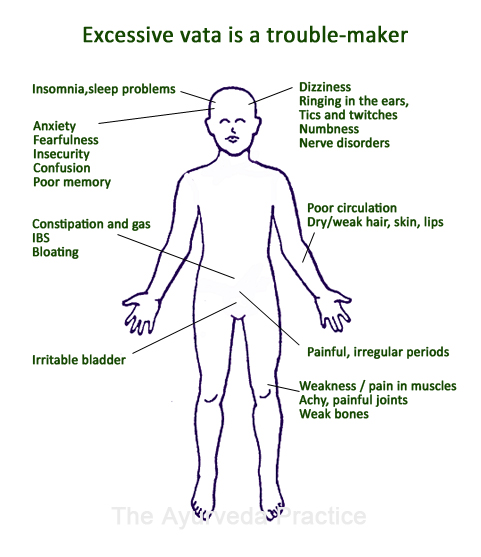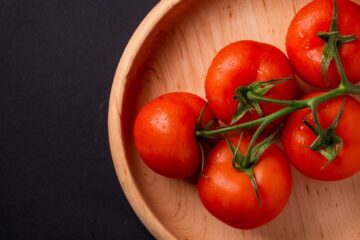Given my usual fascination with digestion, you’d be forgiven for thinking I mean that kind of wind. But, for once, I don’t. In this instance, I refer to vata, the ‘wind’ (or air and space) principle in your body and mind. It is one of the three doshas (vata, pitta and kapha) which are present in every cell, tissue and organ of the body and regulate all physiological and psychological aspects of our lives. Vata is the most important dosha to keep an eye on as it is the most delicate and easily unbalanced dosha and the only one which can move within the body. Hence, if vata goes out of balance, the other two are often pushed out of balance too and we end up in all sorts of trouble.
What kind of trouble can vata cause when out of balance?
Some examples:
- Digestive –constipation and gas, IBS, bloating
- Muscular-skeletal – weakness / pain in muscles, achy, painful joints, weak bones
- Sensory and nervous – dizziness, ringing in the ears, tics and twitches, numbness, nerve disorders
- Circulation, skin & hair – poor circulation, dry/weak hair, skin, lips
- Sleep – insomnia, sleep problems
- Mind – anxiety, fearfulness, insecurity, confusion, poor memory
Why does it go out of balance?
The qualities of vata are cold, light, dry, rough, moving (unsteady) and subtle (minute).
In Ayurveda, it is easy to work out what upsets a dosha – you use ‘The law of similarities[1]’. All things undergo increase by use of or association with similars and decrease by use of or association with dissimilars. So, vata will be increased by things which have the same qualities: cold, light, dry, rough, moving and subtle.
Who suffers from excessive vata?
In my practice I see that nearly all clients have some form of vata imbalance. Why? So many of the things that upset vata are prevalent in every waking moment of ours lives. Consider:
- the weather! If there is one thing that really upsets vata, it’s changeability…, oh and cold. We’ve got plenty of both in the UK.
- the near constant motion of ourselves and everything around us.
- over stimulation – our senses are excessively and continually bombarded with stimuli. Vata needs stability and regulation, over stimulation is guaranteed to disturb.
- ‘stress’ – that all encompassing word. We put enormous pressure on ourselves to reach higher and higher standards of living, to obtain the most recent must-haves. The stress we feel puts us in a near-continual state of fight or flight, which is like a vibration or jangling of the nerves. Given that vata controls the nervous system, it is no wonder that it gets affected by the stress.
- travel – even in the days when the Ayurvedic texts were originating (~ 1000BC), travel was deemed a disturber of vata and that just included horse and carts and riding on animals! The effect of air travel on vata is extreme, train and car travel also having their effect.
- irregular and lack of sleep- we stay up much later than the sun sets and often have poor quality sleep to due overstimulation (physical and mental).
- caffeine – I’ve beaten this drum before, see my article on caffeine.
People who have a vata dominant constitution are even more likely to suffer from vata imbalances and are likely to develop them much quickly and to a higher degree than others. (Find out your likely constitution here).
Watch out for vata in the Autumn
And the time of year that gets vata all distressed? Autumn. Vata has slowly increased during the summer due to the dryness (if we are lucky!) and then as the colder, windier weather commences vata gets truly exacerbated. Changeability is here most of the year round in the UK climate but Autumn and Spring are blessed with yet more of it, and that too isn’t great for vata. So, keep an eye on your vata during this season, especially if you have a vata-dominant constitution or are prone to vata disturbance.
Calm vata down with some simple tips
Using the principle of ‘like increases like’ we can also infer that ‘opposites will decrease’. Therefore to reduce vata we need:
- opposite of cold: WARMTH. Keep warm, don’t underestimate the weather, always have layers. Eat your food warm and have warm drinks, never cold. The quality of your food should be warm too so use warming spices and herbs such as basil, bay leaf, pepper, cardamom, cinnamon, cumin, coriander, garlic, ginger, oregano, mustard, rosemary, thyme and tarragon.
- opposite of light: HEAVY. It’s time to move away from the lighter food of summer. Eating seasonally will automatically move you to heavier, more grounding foods now, for example sweet root vegetables and squashes. Favour naturally sweet, sour and salty foods as these have a more heavy quality.
- opposite of rough and dry: OILY/WET. The most important thing here is oils. Oils are superb at reducing vata as not only are they oily but also heavy and generally warming. Cook with ghee, coconut and virgin olive oils and add other virgin oils (sesame, hemp, flax for example) to your food after cooking. Oil yourself well too, giving yourself regular massages.
- opposite of moving/irregular/unsteady: STILLNESS/STEADINESS. Even if you don’t do it any other time of year, try and make autumn a time where you have some routine. Give yourself 5 or 10 minutes at the start and end of each day to have some stillness away from stimulation, whether that be in meditation, reflection, quiet reading of a nourishing book or simply sitting still.
- opposite of minute/subtle: SUBSTANTIAL/GROUNDING. Eat and sleep well! You should be hungry before you eat but don’t go hungry for long periods of time, make sure you are well-nourished. Get to sleep before 10.30pm and avoid stimulation (such as TV) in the last hour of being awake.
In addition to this, it is important to go into the autumn season cleansed of any accumulated toxins and with strong digestion. Consider an Ayurvedic cleanse in September. Keep yourself strong and vata at bay by taking excellent vata-reducing rejuvenatives such as ashwagandha, dashamula, bala, guggulu and haritaki.
If anyone suffers from the blues in winter, remember that this is the time to start implementing some preventative measures. See the article on SAD for more information.
Remained nourished and grounded this autumn, don’t let the wind get the better of you.
Until next time, take care of yourselves.
Kate
Author: Kate Siraj, Ayurvedic Practitioner, BSc Ayurveda, MChem (Oxon), MAPA.
© The Ayurveda Practice
Photo of tree and elements thanks to FreeDigitalPhotos.net
[1] As Sa Su 1/32






5 Comments
Enjoy your Christmas roast with impunity this winter - The Ayurveda Practice · December 14, 2016 at 10:22
[…] We naturally crave warm, heavier, oilier foods which ground us and keep us warm. The season of autumn and winter are high-vata seasons. This means we can feel dried out, cold and possibly airy and […]
4 causes of sugar cravings and how to banish them - The Ayurveda Practice · March 17, 2017 at 14:46
[…] honey which is sweet but astringent and heating, which makes it great for vata and kapha and for scraping fat and mucous from the body. Honey is the only sweetener recommended […]
Add spices, add flavour, improve nutrition - The Ayurveda Practice · October 13, 2017 at 11:58
[…] you suffering from vata imbalance? Symptoms could include insomnia, pain in the body, wind, constipation, bloating, […]
Your guide to dosha imbalance - The Ayurveda Practice · May 6, 2022 at 11:05
[…] increased for you. For example, your skin is feeling too dry and rough. These are qualities of vata and mean vata has risen too high. You are feeling hot all the time which shows pitta is high as hot […]
Menopause – important life transition not an illness - The Ayurveda Practice · October 6, 2022 at 15:16
[…] a period of activity and achievement in the world. The menopause is roughly the start of the vata stage of life, a more reflective period of grace and wisdom. They are the junction of the […]